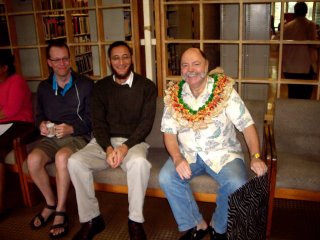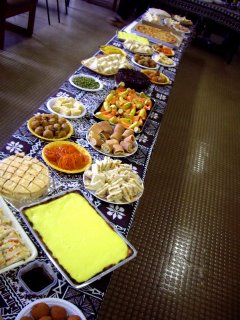inside the man
Sunday, November 19, 2006
Thursday, October 12, 2006
Chris times three
Wednesday, October 04, 2006
New York Masons actively recruiting
The New York Times has run an article about local Masonic Lodges' efforts to recruit new members to their dwindling ranks.
"The lodge also hired a public relations firm to spread the word about its 225th anniversary, which was last month. And the Masons have run advertisements in movie theaters and run one-day classes to award the first three Masonic degrees in a single session. Until then, would-be Masons had to spend months learning what they needed to know to rise from Entered Apprentice to Fellowcraft to Master Mason."
A Secret Society, Spilling a Few Secrets, New York Times, October 4, 2006
"The lodge also hired a public relations firm to spread the word about its 225th anniversary, which was last month. And the Masons have run advertisements in movie theaters and run one-day classes to award the first three Masonic degrees in a single session. Until then, would-be Masons had to spend months learning what they needed to know to rise from Entered Apprentice to Fellowcraft to Master Mason."
A Secret Society, Spilling a Few Secrets, New York Times, October 4, 2006
Thursday, September 28, 2006
US Army report on animal ESP released after 50 years

Here is a recently declassified report commissioned by the US Army to study ESP in animals from a site edited by Russ Kick - The Memory Hole. From the abstract:
In the early 1950s, Dr. Joseph Banks Rhine, based at Duke University, was the foremost researcher in the field of parapsychology, or, using the term he coined: "extrasensory perception." The Army hired Rhine and his Parapsychology Laboratory to research the possibility of using dogs and other animals to detect buried landmines.
The final report for one such contract with Duke University, dated 10 July 1953, remained classified as Confidential for more than 50 years, until it was recently declassified after a long, laborious process. It took ten separate offices five years to clear this short report for release.
The narrative report describes a series of experiments involving German shepherds trying to locate buried landmines. The results appeared promising but also suggested that at least some of the positive results were attributable to the dogs' remarkable sense of smell. The report also examines the possibility of ESP in cats and pigeons.
Rhine was the first to attempt a scientific investigation of paranormal phenomena of this type, and many of his experimental results have been attacked as being the result of a general lack of stringent experimental controls and the possible falsification of records by his laboratory assistants.
The document was obtained by researcher Michael Ravnitzky.
Tags:
Corpses turned away from Fiji hospital
You think wait times are bad at Canadian hospitals? Are hip replacement and MRI wait-lists and hospital bed closures getting you down? The Fiji Times reports that corpses are being turned away from the Wainibokasi Hospital. You can only stay in the morge at this hospital if you die on the premisis.
"We were forced to close the other two coolers after we found out they were not working,'' Dr Koraai said. "Two bodies were occupying the coolers and relatives were asked to bury them as their bodies were beginning to decompose. This was when we realised that the coolers were not working."
"We were forced to close the other two coolers after we found out they were not working,'' Dr Koraai said. "Two bodies were occupying the coolers and relatives were asked to bury them as their bodies were beginning to decompose. This was when we realised that the coolers were not working."
Wednesday, September 13, 2006
Google Earth reveals bizarre weather in Edmonton

The Register reports on one of the extreme cases of altered weather paterns due to global warming as revealled by Google Earth. What is happening to the city where I lived over half of my life - Edmonton, Alberta, Canada?!?
Wednesday, August 16, 2006
Started a new blog
I have decided to try focusing my blogging on one large topic instead of my usual eclecticism. I have started a new blog called Digital Fiji which explores ideas and issues with digital information in Fiji and the South Pacific. Check it out and let me know what you think.
Tags:
Friday, July 21, 2006
Entering a new world
The Air Pacific flight from LAX to Nadi (pronounced "Nandi") was comfortable and blissfully uneventful. We arrived at Nadi International at 5:00 am in the morning. It was disappointing to arrive in the darkness as we had heard the view of the ocean and reef is spectacular.
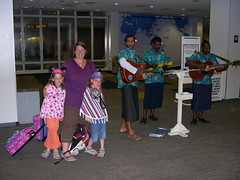
After LAX - "you will never see a more wretched hive of scum and villainy" - it was a delight to be welcomed by airport staff instead of being treated like a potential criminal. After some adventures getting our eight bags through customs and hauling them over the domestic terminal, we were soon on a small twin-prop plane to the much more rustic Nausori airport outside of Suva.
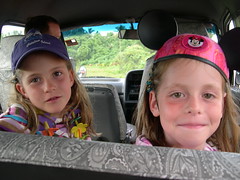
Taxis in Fiji are plentiful and affordable. We learned during our first Fijian cab ride that they are also often rickety old pieces of junk lacking all safety features including seat belts. I will let you be the judge, but it is possible that we may have been easily identified as tourists that day.

The first leg of the drive through Nausori made it quite clear that we were no longer in North America. Scores of children all in school uniforms, with the boys in sulus, filed past on the dusty shoulders of the narrow road. Huge men wielding large double bladed machetes cleared brush from neighboring fields, and ferns and palms everywhere without an evergreen to be seen.
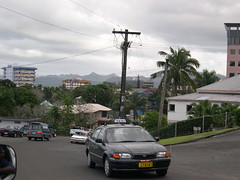
Once our cab entered Suva proper, I was surprised to find a perfectly modern city. We drove directly to the very comfortable five-star Suva Holiday Inn.
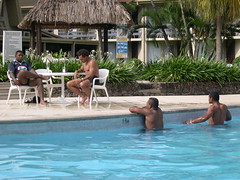
And we shared this very fine accommodation with the Flying Fijians, the national rugby team. They trained on the pitch across the street and then hopped in the pool to relax.
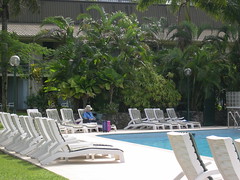
I also found a moment or two of peace by the pool. More soon on our life on the University of the South Pacific campus.

After LAX - "you will never see a more wretched hive of scum and villainy" - it was a delight to be welcomed by airport staff instead of being treated like a potential criminal. After some adventures getting our eight bags through customs and hauling them over the domestic terminal, we were soon on a small twin-prop plane to the much more rustic Nausori airport outside of Suva.

Taxis in Fiji are plentiful and affordable. We learned during our first Fijian cab ride that they are also often rickety old pieces of junk lacking all safety features including seat belts. I will let you be the judge, but it is possible that we may have been easily identified as tourists that day.

The first leg of the drive through Nausori made it quite clear that we were no longer in North America. Scores of children all in school uniforms, with the boys in sulus, filed past on the dusty shoulders of the narrow road. Huge men wielding large double bladed machetes cleared brush from neighboring fields, and ferns and palms everywhere without an evergreen to be seen.

Once our cab entered Suva proper, I was surprised to find a perfectly modern city. We drove directly to the very comfortable five-star Suva Holiday Inn.

And we shared this very fine accommodation with the Flying Fijians, the national rugby team. They trained on the pitch across the street and then hopped in the pool to relax.

I also found a moment or two of peace by the pool. More soon on our life on the University of the South Pacific campus.
Friday, July 14, 2006
All things begin with a queue
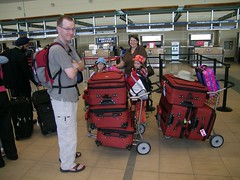
My family and I have had quite an adventure since my last post here. In case you missed the news, we have sold our house and car and relocated from the Great White North to Fijian tropics where I have taken up a new career in library systems management. There is much to tell of our journey.
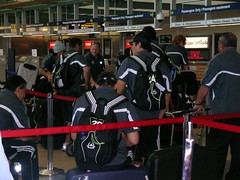
One theme that has colored our journey from the beginning was rugby. I was thrilled to share the first leg of our trip from Edmonton, Alberta, Canada to LA with the New Zealand Maori rugby team, fresh off of their successful campaign at Canada's Churchill Cup until I later learned of the consequences. When we arrived in LA, it soon became clear that there was an issue with our bags - the same eight large suitcases pictured above, he same eight bags that we need to live out of for the next 50 days or so until our container catches up with us in Fiji. After much frustration and queuing it became clear that the rugby team's equipment occupied so much storage space that the airline had bumped economy class baggage to a later flight.

We ended up embarking on our planned four day cruise down the Mexican coast without these bags. We owe a great debt to my old friend Marcus, who lives in LA, for rescuing our bags from the clutches of our overtaxed Canadian airline at LAX. With a quickly purchased bag of sundries from the Long Beach Wal-Mart, we enjoyed a relaxing cruise and were able to prepare ourselves for a day at Disneyland and the long flight to our new home.
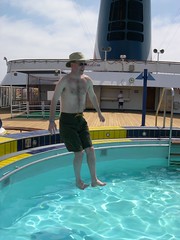
I was even able to take the edge off of my blinding whiteness! Coming up next, our journey to the South Pacific.
Wednesday, June 07, 2006
Europe's unusual urinals

Robert Martin has posted a brief photo essay on the toilets of Britain. What insights into the British mind can we make from these repositories of refuse and effluent?
South Pacific Chris
Friday, May 19, 2006
We're going to Fiji!
Big news - we are moving to Fiji! I have accepted a position at the University of the South Pacific in Suva, Fiji Islands. This is a once in a lifetime opportunity for my family and I - we are all full of nervous excitement! We are throwing a party for family and friends (by invite only) on June 3rd as a way of saying goodbye and to celebrate at least three birthdays within the family.
I cannot possibly explain the complex mix of emotions that I am feeling right now. I am leaving behind wonderful friends, family, and colleagues, not to mention a great job and the best country in the world, but I am heading to new lands and cultures, countless tropical islands, a very different sort of job, and a promising unknown. It is invigorating to shake up your life like this!
I cannot possibly explain the complex mix of emotions that I am feeling right now. I am leaving behind wonderful friends, family, and colleagues, not to mention a great job and the best country in the world, but I am heading to new lands and cultures, countless tropical islands, a very different sort of job, and a promising unknown. It is invigorating to shake up your life like this!
Thursday, April 27, 2006
Starting a school go club

There are many things that I enjoy about the game of Go. One would be the great people that I have met - both online and in person - through the game. Another would be the satisfaction that I feel whenever I receive demonstrable proof that my knowledge of this fascinating game is improving. And a third would be sharing my love of the game with others that are open to learning it. It is this final point that motivated me to try starting up a go club at my children’s elementary school - Garneau School in Edmonton.
I am the father of six-year old twin girls. Much to my joy, they have been interested in playing the occasional game of 9-by-9 capture Go with me since they were four. In September 2005 they entered grade one. I soon noticed that the school had a number of lunch hour clubs for the older children, but nothing for the grades one and twos. Naturally, I thought, there should be a Go club to fill this void!
I found that the school principal, Crystal Mills, who runs the school chess club, was very supportive of the idea. In a matter of days, I had the music room booked every Thursday lunch hour and an announcement was made to parents in the school newsletter. The idea of a lunch hour club was such a novelty for the grades one and twos that on the first day, I found myself immersed in a sea of roughly 40 six and seven-year-olds all eager to learn about this intriguing game with stones that look like black and white candy. Over time, the participation level thinned out to a manageable 10 children per week. The kids are having a great time learning and playing and I am too! It is amazing to see them power through first-capture games on photocopied CGA 9-by-9 boards at lightening speed, and I can see that they are all improving week after week. I have just started trying out “territory Go” with them since the New Year. I cannot wait for the day that one of the children beats me with a two stone handicap - I will be so proud!
Tips for starting a school Go club
- Use the great American Go Association "Teaching Go" page. It is full of wonderful resources. I used some of Susan Weir’s material to help explain the educational value of the Go club to parents.
- Be prepared. Have a lesson plan for every club meeting. Younger children especially want to play, but some group teaching is necessary for them to improve. Decide whether you want to teach first-capture Go to start, as I did, or jump right into "real" Go.
- Secure real glass Go stones - children love the tactile experience of handling the stones. Either borrow them from your local club or see if the school will invest in a couple of sets - they are readily available from online Go vendors. Just do not spend too much as the stone will get damaged over time no matter how careful you are. Do not worry too much about boards - at least initially - as photocopied 9-by-9 boards are all that you need to start.
- For older children, consider using Hikaru-no-Go manga and anime as a teaching tool. I have not tried this with my group, but I am certain that it would work with older children.
- AGA Teaching Go page
- CGA resources page
- The Edmonton Sabaki Go Club sells Go books and stones
- About Hikaru-no-Go
- The Go Aggregator, your one stop for free English Go news, games, and talk (shameless plug)
I would like to say special thanks to the Edmonton Sabaki Go Club (your humble hosts for the 2006 Canadian Open in Edmonton on Labour Day weekend) who graciously loaned three sets of stones to support the Garneau School Go Club. Amazingly, the children have only broken a dozen of the glass stones so far - sorry, guys.
Monday, April 24, 2006
FIFA foolishness
I am, at best, an occassional fan of international football (a.k.a. soccer). I tend to perk up and pay attention every four years when the World Cup rolls around. While I cannot claim any level of expertise, I was shocked an dumfounded at the rediculousness of the recently published FIFA rankings heading into WC2006. The USA is fourth best team in the world? Ahead of such countries as Spain, Argentina, Italy, England, and Germany? And Italy is 14th place? Foolishness. Complete and utter foolishness.
The USA is in Group E along with Italy, the Czech Republic, and Ghana. I will be very surprised if we see anyone other than Italy and the Czech Republic advancing to Stage 2.
The USA is in Group E along with Italy, the Czech Republic, and Ghana. I will be very surprised if we see anyone other than Italy and the Czech Republic advancing to Stage 2.
Sunday, April 16, 2006
The two stage Easter egg rocket
I rigged up a two stage model to celebrate Easter this year. I don't know how it will fly, but it is interesting that it has a lot more propellant mass than anything else!
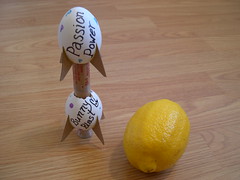
Update: We did not get to launch this two stage baby yesterday on Easter as it snowed and rained of and on all day long. In the mean time, I did a little research into the technical characteristics of the two stage Easter egg. It is essentially comprised of 22 grams of egg, cardboard fin, and recovery wadding (stuffed inside the eggs to stabilize the motors); 18.8 grams of cardboard engine casing; and 21.6 grams of black powder propellant. If the rocket would fly vertically, which it won't, it would go pretty high - each of the C6 "booster" class engines averages 4.76 Newtons of thrust over 1.86 seconds.
Maybe we will have time to fire it off today...
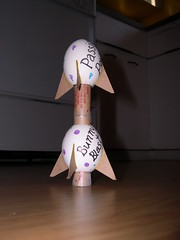

Update: We did not get to launch this two stage baby yesterday on Easter as it snowed and rained of and on all day long. In the mean time, I did a little research into the technical characteristics of the two stage Easter egg. It is essentially comprised of 22 grams of egg, cardboard fin, and recovery wadding (stuffed inside the eggs to stabilize the motors); 18.8 grams of cardboard engine casing; and 21.6 grams of black powder propellant. If the rocket would fly vertically, which it won't, it would go pretty high - each of the C6 "booster" class engines averages 4.76 Newtons of thrust over 1.86 seconds.
Maybe we will have time to fire it off today...

Saturday, April 15, 2006
Monday, April 10, 2006
US government agencies breach privacy legislation
The Washington Post and SANS NewsBites report that a number of US government agencies are violating privacy legislation in the US$30 million business of buying data on law abiding citizens from data brokers.
"The Justice Department, the Department of Homeland Security and two other agencies examined by the GAO spent about $30 million last year on companies that maintain billions of electronic files about adults' current and past addresses, family members and associates, buying habits, personal finances, listed and unlisted phone numbers, and much more. But those agencies often do not limit the collection and use of information about law-abiding citizens, as required by the Privacy Act of 1974 and other laws."
This news comes hot on the heals of US Senator Patrick Leahy questioning the FBI's US$12 million five-year deal with ChoicePoint in the wake of ChoicePoint and LexisNexis selling files on nearly 200,000 individuals to "fraud artists" last year.
I knew that there was a large market for the services of data brokers, but it had not occurred to me that the US government was a significant client. Interested readers may want to look back to my post on data brokers and the privacy of Canadian citizens.
"The Justice Department, the Department of Homeland Security and two other agencies examined by the GAO spent about $30 million last year on companies that maintain billions of electronic files about adults' current and past addresses, family members and associates, buying habits, personal finances, listed and unlisted phone numbers, and much more. But those agencies often do not limit the collection and use of information about law-abiding citizens, as required by the Privacy Act of 1974 and other laws."
This news comes hot on the heals of US Senator Patrick Leahy questioning the FBI's US$12 million five-year deal with ChoicePoint in the wake of ChoicePoint and LexisNexis selling files on nearly 200,000 individuals to "fraud artists" last year.
I knew that there was a large market for the services of data brokers, but it had not occurred to me that the US government was a significant client. Interested readers may want to look back to my post on data brokers and the privacy of Canadian citizens.
Tags: privacy
Monday, March 13, 2006
How to: Road kill smoothy

Radio New Zealand, like my own national broadcaster, the CBC, has recently been experimenting with podcasting a couple of their regular programs. One that I listened to today was reminiscent of a Tom Green TV show episode. In fact, it would be considered quite humorous gross-out comedy if it were not a serious program. Listen in as RNZ's "Mr. Tightwad", a regular personality on the "This Way Up" program, saves a few bucks on dog food by making road kill smoothies for man's best friend. There is even a blow-by-blow description of scraping your road kill off the road and cleaning it followed by crystal clear audio of the carcass being ground up in Mr. Tightwad's food processor!
Tags: gross
Thursday, March 09, 2006
Google and censorship in China
My buddy Shawn Murphy sent me the following pair of links. Comparing these two URLs says much more than a couple thousand words of blogging.
- Here is what Chinese users of google see when they search for Tiananmen photos:
http://images.google.cn/images?q=tiananmen
And the rest of the world...
http://images.google.com/images?q=tiananmen
Tags: google censorship china
Tuesday, March 07, 2006
Schneier on the future of privacy
In a recent essay, Bruce Schneier paints a chilling picture of the future of privacy in the USA. Consider the following:
"Wholesale surveillance is a whole new world. It's not 'follow that car,' it's 'follow every car.' The National Security Agency can eavesdrop on every phone call, looking for patterns of communication or keywords that might indicate a conversation between terrorists. Many airports collect the license plates of every car in their parking lots, and can use that database to locate suspicious or abandoned cars. Several cities have stationary or car-mounted license-plate scanners that keep records of every car that passes, and save that data for later analysis."
It is important to understand for those who do not follow American national security news that this is not science fiction or dystopic futurism. This paragraph describes the currently deployed surveillance technology in the USA.
From a personal privacy perspective, the future is not rosy for US citizens. The trend towards increasingly pervasive and invasive global surveillance technologies shows no sign of slowing, and the US legislative environment shows little interest in limiting the employment of these technologies by government agencies tasked with responsibility for Homeland Security.
One intriguing idea that Schneier puts forward is the notion of the 'life recorder'.
"A 'life recorder' you can wear on your lapel that constantly records is still a few generations off: 200 gigabytes/year for audio and 700 gigabytes/year for video. It'll be sold as a security device, so that no one can attack you without being recorded. When that happens, will not wearing a life recorder be used as evidence that someone is up to no good, just as prosecutors today use the fact that someone left his cell phone at home as evidence that he didn't want to be tracked?"
In principal, to me the life recorder is not a particularly odious idea as long as it remains under the control of the owner. In fact, I applaud laws and technologies that allow me to maintain control over my own personal information. One example of this is the CustomizeGoogle Firefox extension which I am using right now. Among its many features is the ability to alter your Google cookie UID and blocking communications with Google Analytics making it a little harder for Google to build up a comprehensive web surfing profile on you. The life recorder becomes a particular privacy concern only if:
As a Canadian, I am hopeful that Canada continues to choose a path that strikes more of a balance between personal privacy rights and national security concerns in comparison to our neighbors to the south.
Schneier's essay was originally published in the Minneapolis Star Tribune.
"Wholesale surveillance is a whole new world. It's not 'follow that car,' it's 'follow every car.' The National Security Agency can eavesdrop on every phone call, looking for patterns of communication or keywords that might indicate a conversation between terrorists. Many airports collect the license plates of every car in their parking lots, and can use that database to locate suspicious or abandoned cars. Several cities have stationary or car-mounted license-plate scanners that keep records of every car that passes, and save that data for later analysis."
It is important to understand for those who do not follow American national security news that this is not science fiction or dystopic futurism. This paragraph describes the currently deployed surveillance technology in the USA.
From a personal privacy perspective, the future is not rosy for US citizens. The trend towards increasingly pervasive and invasive global surveillance technologies shows no sign of slowing, and the US legislative environment shows little interest in limiting the employment of these technologies by government agencies tasked with responsibility for Homeland Security.
One intriguing idea that Schneier puts forward is the notion of the 'life recorder'.
"A 'life recorder' you can wear on your lapel that constantly records is still a few generations off: 200 gigabytes/year for audio and 700 gigabytes/year for video. It'll be sold as a security device, so that no one can attack you without being recorded. When that happens, will not wearing a life recorder be used as evidence that someone is up to no good, just as prosecutors today use the fact that someone left his cell phone at home as evidence that he didn't want to be tracked?"
In principal, to me the life recorder is not a particularly odious idea as long as it remains under the control of the owner. In fact, I applaud laws and technologies that allow me to maintain control over my own personal information. One example of this is the CustomizeGoogle Firefox extension which I am using right now. Among its many features is the ability to alter your Google cookie UID and blocking communications with Google Analytics making it a little harder for Google to build up a comprehensive web surfing profile on you. The life recorder becomes a particular privacy concern only if:
- As Schneier suggests, you attract the attention to yourself for not wearing one;
- Somebody with a bluesniper rifle a kilometer away can read your life recordings without your knowledge; or
- When Google offers a free service to perpetually archive your life for you (so that your holographic data chip does not fill up) - placing everyone's complete life recording within the reach of unaccountable access by government authorities under the Patriot Act.
As a Canadian, I am hopeful that Canada continues to choose a path that strikes more of a balance between personal privacy rights and national security concerns in comparison to our neighbors to the south.
Schneier's essay was originally published in the Minneapolis Star Tribune.
Tags: privacy
Tuesday, February 28, 2006
Archie the giant squid on display in London
Friday, February 24, 2006
Ancient Sumeria and Knowledge Management
Knowledge Street traces the over 5000 year history of Knowledge Management.
"3500 BC: The cuneiform language is invented so that information can be stored, transferred and otherwise outlive its maker. Explicit Knowledge is born!"
"3500 BC: The cuneiform language is invented so that information can be stored, transferred and otherwise outlive its maker. Explicit Knowledge is born!"
Tags: knowledge
Thursday, February 02, 2006
Caffeine infused soap - does it work?

I am always looking for new ways to feed my adiction to the sweet purine alkaloid. Naturally I was excited when ars technica posted this important study - complete with a bar graph - on the effectiveness of caffeine infused soap as a mechanism for delivering caffeine to the human circulatory system.
"In the search for ever-more-efficient ways to ingest caffeine, someone came up with the bright idea of adding caffeine to soap. That way, all you need to do is to stumble out of bed and into the shower, wash with a bar of caffeine-infused soap, and you're well on your way to full wakefulness."
Tags: caffeine
Monday, January 30, 2006
Multiculturalism on the Canadian Prairies
One does not typically look to Colby Cosh for insight into the new pluralism, but here is a great quote from his blog:
"When I was a boy, the Ukrainian Hour was probably the single most popular program on what was then the most popular radio station in Northern Alberta. And aside from a brief rundown of content at the outset, it wasn't a bilingual show either. Which, for some reason, didn't stop my father--and thousands of others who, like him, are no more Ukrainian than Boutros Boutros-Ghali--from listening religiously. That's sort of the way it works out here: you kind of grow up Ukrainian, whatever you actually are."
"When I was a boy, the Ukrainian Hour was probably the single most popular program on what was then the most popular radio station in Northern Alberta. And aside from a brief rundown of content at the outset, it wasn't a bilingual show either. Which, for some reason, didn't stop my father--and thousands of others who, like him, are no more Ukrainian than Boutros Boutros-Ghali--from listening religiously. That's sort of the way it works out here: you kind of grow up Ukrainian, whatever you actually are."
Tags: pluralism
Thursday, January 26, 2006
Stego for your camera phone
Fujitsu has developed a technology that allows your camera phone to decode information from printed materials including reading barcodes, reading QR codes (sort of 2-D barcodes), or stegonographically hidden codes in a glossy magazine. This is a very interesting idea, but is it a useful one? (Fujitsu Labs announcement, newswireless.net blog post).
Tags: stego
Japanese library drops library cards for biometrics
A new public library opening in Naka, Japan will feature "touchless" palm scanners for borrowers according to asahi.com.
"A new city library opening here in October will replace library cards with state-of-the-art biometric technology. Borrowers will hold their palms over a device that identifies people by comparing the pattern of veins in their palms with prerecorded patterns."
"A new city library opening here in October will replace library cards with state-of-the-art biometric technology. Borrowers will hold their palms over a device that identifies people by comparing the pattern of veins in their palms with prerecorded patterns."
Monday, January 16, 2006
Copyright and your vote
Based on the now dead Bill C-60, the Liberals support a more American style copyright law in Canada, at least in terms of owners' rights (and a lack of users' rights). Michael Geist has been covering the copyright positions of various parties and candidates on his blog. Here is an excerpt:
"Not to be overlooked by the Bulte issue is the fact that the major parties have provided some feedback into their views on copyright (many individual candidates have as well - those are posted at Digital-Copyright.ca). The Canadian Teachers Federation obtained responses from all parties on the education issue and access to publicly available materials on the Internet. The Liberals confirmed their decision to shift away from the Bulte report by again committing to a consultation on the issue. The Conservatives and NDP took stronger pro-education stands."
"Not to be overlooked by the Bulte issue is the fact that the major parties have provided some feedback into their views on copyright (many individual candidates have as well - those are posted at Digital-Copyright.ca). The Canadian Teachers Federation obtained responses from all parties on the education issue and access to publicly available materials on the Internet. The Liberals confirmed their decision to shift away from the Bulte report by again committing to a consultation on the issue. The Conservatives and NDP took stronger pro-education stands."
Tags: copyright
Wednesday, January 04, 2006
I got dugg!
While I do not think that I have a snowball's chance in hell of making the front page, it is exciting to see that my post on playing hacker's capture the flag got posted to digg as Cool Play by Play of Lan Hacking Competition. Go and add your own digg if you want to see me (or my cool goat icon) on the front page!
It looks like Mr. Cosh has also taken a break from election blogging to briefly mention this item.
It looks like Mr. Cosh has also taken a break from election blogging to briefly mention this item.
Subscribe to:
Comments (Atom)
Blog Archive
About Me
- thrashor
- Edmonton, Alberta, Canada
- Returned to working as a Management Consultant, specializing in risk, security, and regulatory compliance, with Fujitsu Canada after running the IT shop in the largest library in the South Pacific.
